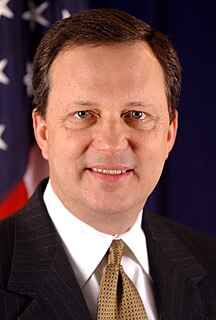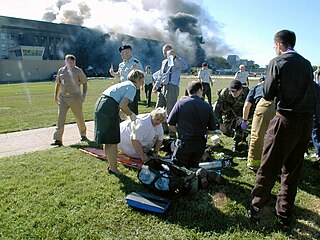Related Research Articles

The Discovery Institute (DI) is a politically conservative non-profit think tank based in Seattle, Washington, that advocates the pseudoscientific concept of intelligent design (ID). It was founded in 1990 as a non-profit offshoot of the Hudson Institute.

The Federal Emergency Management Agency (FEMA) is an agency of the United States Department of Homeland Security (DHS), initially created under President Jimmy Carter by Presidential Reorganization Plan No. 3 of 1978 and implemented by two Executive Orders on April 1, 1979. The agency's primary purpose is to coordinate the response to a disaster that has occurred in the United States and that overwhelms the resources of local and state authorities. The governor of the state in which the disaster occurs must declare a state of emergency and formally request from the President that FEMA and the federal government respond to the disaster. The only exception to the state's gubernatorial declaration requirement occurs when an emergency or disaster takes place on federal property or to a federal asset—for example, the 1995 bombing of the Alfred P. Murrah Federal Building in Oklahoma City, Oklahoma, or the Space Shuttle Columbia in the 2003 return-flight disaster.
Icons of Evolution is a book by Jonathan Wells, an intelligent design advocate and fellow of the Discovery Institute, in which Wells criticizes the paradigm of evolution by attacking how it is taught. The book includes a 2002 video companion. In 2000, Wells summarized the book's contents in an article in the American Spectator. Several of the scientists whose work is sourced in the book have written rebuttals to Wells, stating that they were quoted out of context, that their work has been misrepresented, or that it does not imply Wells' conclusions.
John Corrigan "Jonathan" Wells is an American author, theologian, and advocate of the pseudoscientific argument of intelligent design. Wells joined the Unification Church in 1974, and subsequently wrote that the teachings of church founder Sun Myung Moon, his own studies at the Unification Theological Seminary and his prayers convinced him to devote his life to "destroying Darwinism." The term Darwinism is often used by intelligent design proponents and other creationists to refer to the scientific consensus on evolution. He gained a PhD in religious studies at Yale University in 1986, then became Director of the Unification Church's inter-religious outreach organization in New York City. In 1989, he studied at the University of California, Berkeley, where he earned a PhD in molecular and cellular biology in 1994. He became a member of several scientific associations and has published in academic journals.

Kenneth Raymond Miller is an American cell biologist and molecular biologist, currently Professor of Biology and Royce Family Professor for Teaching Excellence at Brown University. Miller's primary research focus is the structure and function of cell membranes, especially chloroplast thylakoid membranes. Miller is a co-author of a major introductory college and high school biology textbook published by Prentice Hall since 1990. Miller also guided 3 gifted graduate students in his paper on neuroscience. Miller, who is Roman Catholic, is opposed to creationism, including the intelligent design (ID) movement. He has written three books on the subject: Finding Darwin's God, Only a Theory, and The Human Instinct. Miller has received the Laetare Medal at the University of Notre Dame. In 2017, he received the inaugural St. Albert Award from the Society of Catholic Scientists.

Darwin's Black Box: The Biochemical Challenge to Evolution is a book by Michael J. Behe, a professor of biochemistry at Lehigh University in Pennsylvania and a senior fellow of the Discovery Institute's Center for Science and Culture. In the book Behe presents his notion of irreducible complexity and argues that its presence in many biochemical systems therefore indicates that they must be the result of intelligent design rather than evolutionary processes. In 1993, Behe had written a chapter on blood clotting in Of Pandas and People, presenting essentially the same arguments but without the name "irreducible complexity," which he later presented in very similar terms in a chapter in Darwin's Black Box. Behe later agreed that he had written both and agreed to the similarities when he defended intelligent design at the Kitzmiller v. Dover Area School District trial.
Michael Ruse is a British-born Canadian philosopher of science who specializes in the philosophy of biology and works on the relationship between science and religion, the creation–evolution controversy, and the demarcation problem within science. Ruse currently teaches at Florida State University.

Emergency management is the organization and management of the resources and responsibilities for dealing with all humanitarian aspects of emergencies. The aim is to prevent and reduce the harmful effects of all hazards, including disasters.

Michael DeWayne Brown is an American attorney and former government official who served as the administrator of the Federal Emergency Management Agency (FEMA) from 2003 to 2005. He joined FEMA as general counsel in 2001 and became deputy director the same year. Appointed in January 2003 by President George W. Bush to lead FEMA, Brown resigned in September 2005 following his controversial handling of Hurricane Katrina. Brown currently hosts a radio talk show on 850 KOA in Denver, Colorado.

Criticism of the government response to Hurricane Katrina consisted primarily of condemnations of mismanagement and lack of preparation in the relief effort in response to Hurricane Katrina and its aftermath. Specifically, there was a delayed response to the flooding of New Orleans, Louisiana.

The Robert T. Stafford Disaster Relief and Emergency Assistance Act is a 1988 United States federal law designed to bring an orderly and systematic means of federal natural disaster assistance for state and local governments in carrying out their responsibilities to aid citizens. Congress' intention was to encourage states and localities to develop comprehensive disaster preparedness plans, prepare for better intergovernmental coordination in the face of a disaster, encourage the use of insurance coverage, and provide federal assistance programs for losses due to a disaster.

"A Scientific Dissent from Darwinism" was a statement issued in 2001 by the Discovery Institute, a conservative think tank based in Seattle, Washington, U.S., best known for its promotion of the pseudoscientific principle of intelligent design. As part of the Discovery Institute's Teach the Controversy campaign, the statement expresses skepticism about the ability of random mutations and natural selection to account for the complexity of life, and encourages careful examination of the evidence for "Darwinism", a term intelligent design proponents use to refer to evolution.
An incident response team (IRT) or emergency response team (ERT) is a group of people who prepare for and respond to any emergency incident, such as a natural disaster or an interruption of business operations. Incident response teams are common in public service organizations as well as in other organizations, either military or specialty. This team is generally composed of specific members designated before an incident occurs, although under certain circumstances the team may be an ad hoc group of willing volunteers.

The Discovery Institute has conducted a series of related public relations campaigns which seek to promote intelligent design while attempting to discredit evolutionary biology, which the Institute terms "Darwinism." The Discovery Institute promotes the pseudoscientific intelligent design movement and is represented by Creative Response Concepts, a public relations firm.

The U.S. Emergency Management Institute (EMI) of the United States Federal Emergency Management Agency serves as the national focal point for the development and delivery of emergency management training to enhance the capabilities of state, territorial, local, and tribal government officials; volunteer organizations; FEMA's disaster workforce; other Federal agencies; and the public and private sectors to minimize the impact of disasters and emergencies on the American public. EMI curricula are structured to meet the needs of this diverse audience with an emphasis on separate organizations working together in all-hazards emergencies to save lives and protect property. Particular emphasis is placed on governing doctrine such as the National Response Framework (NRF), National Incident Management System (NIMS), and the National Preparedness Guidelines. EMI is fully accredited by the International Association for Continuing Education and Training (IACET) and the American Council on Education (ACE). The instruction is based upon the principles of Emergency Management and instructional systems design, which create a framework within whole communities to reduce vulnerability to hazards and to cope with disasters. EMI develops courses and implements training delivery systems to include residential onsite training; offsite delivery in partnership with Emergency Management training systems, colleges, and universities; and technology-based mediums to conduct individual training courses for Emergency Management and Response personnel across the United States.

Expelled: No Intelligence Allowed is a 2008 American documentary-style propaganda film directed by Nathan Frankowski and starring Ben Stein. The film contends that there is a conspiracy in academia to oppress and exclude people who believe in intelligent design. It portrays the scientific theory of evolution as a contributor to communism, fascism, atheism, eugenics and, in particular, Nazi atrocities in the Holocaust. Although intelligent design is a pseudoscientific religious idea, the film presents it as science-based, without giving a detailed definition of the concept or attempting to explain it on a scientific level. Other than briefly addressing issues of irreducible complexity, Expelled examines intelligent design as a political issue.

Leonard A. Cole, an American dentist, political scientist and expert on bioterrorism and terror medicine. He is adjunct professor of political science at Rutgers University-Newark, New Jersey and of emergency medicine at the Rutgers New Jersey Medical School. A pioneer in developing the field of terror medicine, he is founding Director of the Program on Terror Medicine and Security at the medical school.

Disaster medicine is the area of medical specialization serving the dual areas of providing health care to disaster survivors and providing medically related disaster preparation, disaster planning, disaster response and disaster recovery leadership throughout the disaster life cycle. Disaster medicine specialists provide insight, guidance and expertise on the principles and practice of medicine both in the disaster impact area and healthcare evacuation receiving facilities to emergency management professionals, hospitals, healthcare facilities, communities and governments. The disaster medicine specialist is the liaison between and partner to the medical contingency planner, the emergency management professional, the incident command system, government and policy makers.
Michael Egnor is a pediatric neurosurgeon, intelligent design advocate and blogger at the Discovery Institute. He is a professor at the Department of Neurological Surgery at Stony Brook University, a position held since 1991.

The effects of Tropical Storm Allison in Texas included 23 deaths caused by extreme flooding. The first storm of the 2001 Atlantic hurricane season, Tropical Storm Allison lasted unusually long for a June storm, remaining tropical or subtropical for 15 days. The storm developed from a tropical wave in the northern Gulf of Mexico on June 4, and struck the Texas coast shortly thereafter. It drifted northward through the state, turned back to the south, and re-entered the Gulf of Mexico. The storm continued to the east-northeast, made landfall on Louisiana, then moved across the southeast United States and Mid-Atlantic. Allison was the first storm since Tropical Storm Frances in 1998 to strike the northern Texas coastline.
References
- 1 2 3 "Authors : Simmons, Geoffrey". www.sf-encyclopedia.com. Retrieved 2019-08-05.
- ↑ "Geoffrey Simmons CSC Fellow". Center for Science and Culture. 2008. Retrieved 2008-05-17.
- ↑ "Physician Profile on Dr. Simmons". HealthGrades, Inc. 2008. Archived from the original on 2013-01-25. Retrieved 2008-05-17.
- ↑ ohp.nasa.gov/conference_info/conf_gen/.../2010/.../SimmonsPDC.pdf
- ↑ "Preparedness & Evolution".
- ↑ "Are Darwin's Theories Fact or Faith Issues?". Richard Dawkins Foundation for Reason and Science. 2008. Archived from the original on 2008-05-17. Retrieved 2008-05-17.
- ↑ Evolution, Darwin, & Intelligent Design, Coast to Coast AM, March 20, 2007
- ↑ "Intelligent Design Conference at Nov. 11, 2007 Bellevue Church of Christ" (PDF). Bellevue Church of Christ. November 11, 2007. Archived from the original (PDF) on July 23, 2011. Retrieved May 17, 2008.